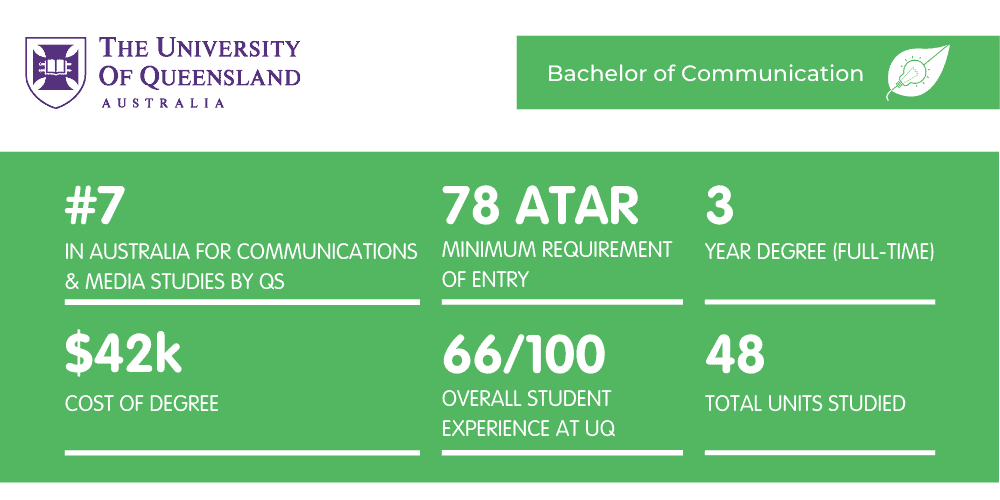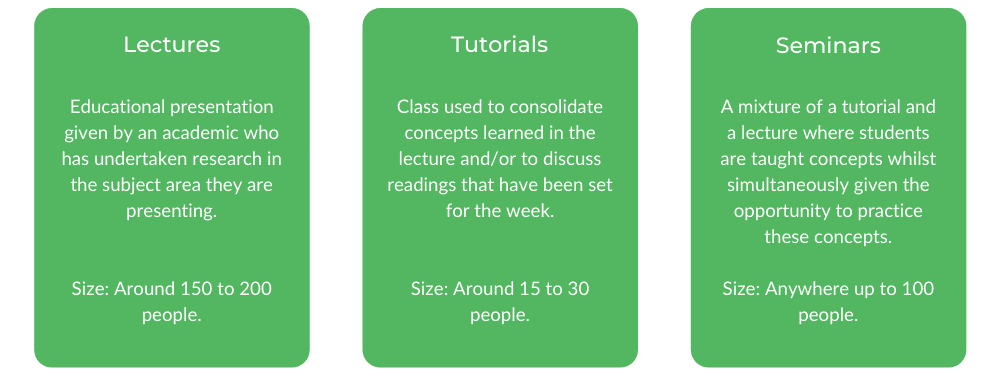Interested in telling stories or maybe you’re a savvy social media user? Maybe you are interested in screen production or radio? A Bachelor of Communication at UQ could help build the foundations for a career involved with media platforms and technologies.
Let’s take a look at it together!
What is a Bachelor of Communication at UQ?
Core Units and Specialisations
How to Get into a Bachelor of Communication at UQ
What’s the Teaching Format?
What’s the Faculty and Culture Like?
What is a Bachelor of Communication at UQ?
In a world of ever changing technology and media landscape, communication specialists are increasingly in demand. A Bachelor of Communication from UQ prepares students for creative and innovative use of media and communications.
Students develop strong foundations in writing, practice and production skills, and critical thinking. The degree allows students to explore a wide range of communication like emerging media platforms and technologies, social media, mobile media, screen, audio and written forms.
Additionally, UQ has in-built internships within their Communication degree! This would offer you the chance to develop industry-focused skills while working and gain practical experience.
Double Degrees
UQ offers a Bachelor of Communication as a dual program as well, allowing students to study it concurrently with a Bachelor of Arts, Journalism or Business Management.
Choosing this pathway will add an extra year onto your degree and reduce the electives you make take in your course, however you’ll graduate with two degrees and qualifications!
Honours
UQ also offers an Honours program for their Bachelor of Communication, developing advanced skills in communication theory, research, policy and practice through this program.
It is an extra year of study and includes a combination of coursework and research in a relevant area of communication where students research a communication-related issue and present their findings in a thesis.
Entry is offered to students who have a 5.5 GPA in their Communication course.
Career Paths
Students who graduate from a Bachelor of Communication will have a range of skills like critical analysis, research, production, media management, or developing strategic campaigns for clients.
These transferable skills provide students with solid foundations that can be taken beyond the media sector and to corporates and marketing departments. Some careers include:
- Broadcast Producer
- Social Media Strategist
- Digital Media Manager
- Public Relations and Social Media Manager
- Political Staffer
- Public Relations Specialist
- Copywriter
Learn about other careers you can pursue with a Communication degree here!
Core Units and Specialisations
What are the Core Units?
A Bachelor of Communication at UQ consists of a total of 48 units. These are divided across three categories with 16 units from core courses, a chosen major and general electives. Some core units undertaken include:
- Media and Society
- Multimedia
- Writing Creativity
- Communication Research Methods
- Communication Law and Ethics
Core courses introduce you to core theory and skills that underpin Communications. For example, Media and Society encourages students to examine and critically assess the relationship between media and society, taking a look at how media and cultural industries shape our experience of the world. It examines how media is used to represent the world and exercise power.
Communication Research Methods provides students with the foundations of discipline-specific research methods, introducing qualitative and quantitative research methods. While this skill and course is not usually associated with a Communication degree, it is an extremely valuable skill equipping students with the ability to identify which claims and conclusions reported in media can be trusted.
“I loved it [Communication Research Methods], there was just something fun about making a survey and analysing the data and doing a lit review.” — Emma, Bachelor of Communication (Digital Media)/Bachelor of Arts (History and Psychology) IV at UQ
The elective units are an extremely flexible part of the degree where students can choose to pick up another major, complete two minors or one minor with general elective courses. Thus, students can pursue interests or additional skills which may enhance their specialisation.
What are the Specialisations?
Two specialisations are available for a Bachelor of Communications at UQ, these are Digital Media and Public Relations.
Digital Media focusses on the evolution of media technologies and industries, offering students an opportunity to look at interactive and data-driven platforms. They also study theories regarding the domains of cultural production and the role media can play in the formation of identity.
On the other hand, a Public Relations specialisation arms students with both technical and advisory roles central to public relations. Students develop an understanding of the role of public relations locally and globally, looking at their ethical, social and legal responsibilities.
“It teaches you to think very critically about the media, but I think the PR majors would say, ‘I’ve learnt so much about how to positively boost a brand’. Whereas for me, I’m more on the side of analysis in digital media.” — Emma
Majors and minors that students can pick from after choosing their specialisation include:
- Interaction Design
- Journalism
- Writing
Internship Opportunities
Studying a Bachelor of Communication at UQ comes with an in-built internship, ensuring that students gain industry-based experience to integrate the knowledge they have learned in university with professional practice. The course coordinator aids students in looking for and applying to internships, ensuring that students are well supported.
Emma undertook her internship last semester with Greenpeace Australia Pacific, helping them in their Communications department.
“I love it because I want to do environmental communications and it’s pretty much exactly what I want to be doing.” — Emma
How to Get into a Bachelor of Communication at UQ
To study a Bachelor of Communication at UQ, students need to have achieved an ATAR of 78 and completed English in Year 12, or an equivalent of it. UQ has a range of admission schemes and pathway options for students who did not meet the ATAR requirement.
Students who are approved for UQ Link receive 5 entry rank adjustments to help them with their entry into university. This is available for students who experienced educational disadvantage due to financial hardship.
Scholarships
A range of Scholarships are available at UQ, these are awarded based on academic merit, Indigenous background, creative excellence, equity, financial hardship and sporting excellence.
The Tertiary Access Payment is available to new students to reduce the financial pressure of relocating or starting at UQ. It is available to students who live more than 90 minutes away from the main campus by public transport.
The UQ Link Scholarship is awarded to students who experienced educational disadvantage due to financial hardships.
Lastly, UQ’s Academic Scholarship Program rewards achievements of outstanding school leavers and gap year students. These are available for students who achieve an ATAR of 95.00 or more during their HSC.
What’s the Teaching Format?
UQ has two semesters per year, with students taking four units per semester in a full-time study load.
Class Structure
Generally, each unit will have around three hours of contact per week, either a two hour seminar with a one hour tutorial or one hour lectures with two hour tutorials.
Lectures will introduce students to foundational theories and concepts related to media with an academic presenting off a slide and answering student questions. Similarly, seminars also introduce students to new knowledge however they tend to be more interactive, getting students to discuss ideas in groups.
Tutorials offer students an opportunity to clarify concepts that they learned in the lecture and readings assigned. It provides students with an opportunity to consolidate knowledge learnt and test their understanding of theory and concepts by applying them to case studies.
As you progress through the degree, class sizes tend to become smaller with tutorials in the first year having up to 30 students, but by third year there are only about 15 students in a class.
What kinds of assessments do you complete?
- Online Quizzes
- Essays
- Literature Reviews
- Presentations
- Reports
- Projects
Presentations and projects are more practical aspects of a Communication degree, developing student’s skills in pitching, presenting and creating media products. The nature of the project will depend on the course students are taking, these may be short films, articles, creative pieces or multimedia projects.
Skills You Refine and Learn
Research is a particularly important skill that you’ll develop through a Bachelor of Communication at UQ — you’ll learn about both qualitative and quantitative research methods.
Through all the readings and discussions you’ll have, you’ll develop your critical thinking and analytical skills too.
“You learn to break stuff down and consider corporate or vested interests among stuff. So if I‘m watching the news I’m like this is just free advertising for the company or they’re only saying that because their sponsors have this idea. So it kind of teaches you to think very critically about the media.” — Emma
What’s the Faculty and Culture Like?
Faculty
Studying a Bachelor of Communication at UQ provides students with a range of options and flexibility in their degree with courses in journalism, writing, literature, art history and the arts being offered.
However, this can also be a downside as it reduces the chance of you seeing the same person after a semester or class has ended. Thus, your best bet for making friends while studying Communication is to join one of the many societies that UQ has on offer!
Notable staff members include Professor Venero Armanno who has published two collections of short stories and ten novels. He is a recipient of the Queensland Premier’s Literary Award and his short stories have been anthologised internationally. Besides writing, he has also worked as a scriptwriter with several production companies.
Culture
As previously mentioned, UQ offers a wide range of options to students studying Communication, allowing students to diversify their studies through minors. There are also a wide range of societies offered, providing students with opportunity to engage in campus life outside of academics.
Emma recalls her lecturer and tutor for Political Communication saying, “She was amazing. She was really personal and explained things so well, and she was very approachable too. Super supportive!”
Societies
The UQ Journalism and Communications Society provides students with support in their professional, academic and social needs during the duration of their degree. They hold various events throughout the year to help students to connect with their peers and professionals in the field of Communication.
Highlight events include their two Professional Networking evenings every year where professionals offer advice on what it takes to work in the profession and their journey in getting there. They also hold an Annual Ball for students to get to know each other in a fun setting and Communication Workshops to help further develop and refine skills.
Support
If you’re a little unsure about where you’re heading after uni, UQ provides students with career advising appointments.
UQ also has a Student Wellness Centre providing support to students during their university degree and offering free counselling. Thus if students are struggling with mental health issues or need help with arrangements for their study, they can get reach out for the right support.
The administrative staff are also very supportive and responsive to student enquiries, providing progression checks for students — telling them what they need to complete and projecting when they will graduate.
Tiffany Fong is currently completing a double degree in Media and Communications with Law at Macquarie University. She currently contributes to the university zine, Grapeshot where she enjoys writing feature articles, commentary on current affairs or whatever weird interest that has taken over her mind during that month. During her spare time, Tiffany enjoys reading, writing, taking care of her plants or cuddling with her two dogs.






